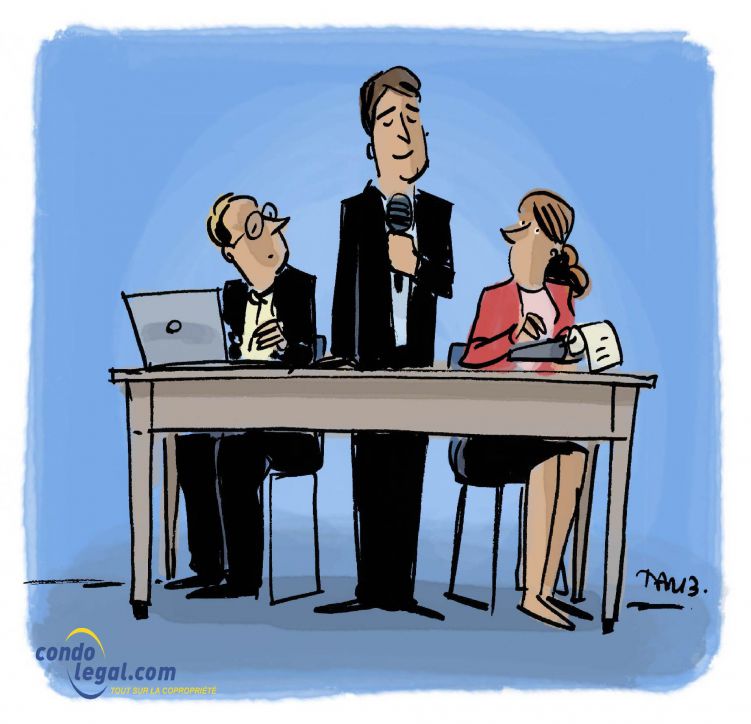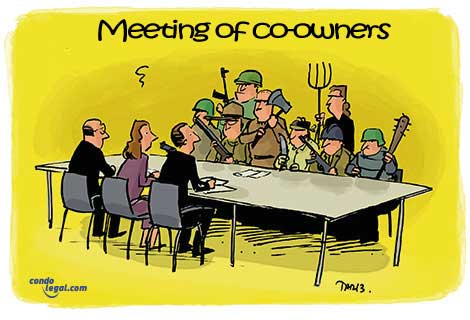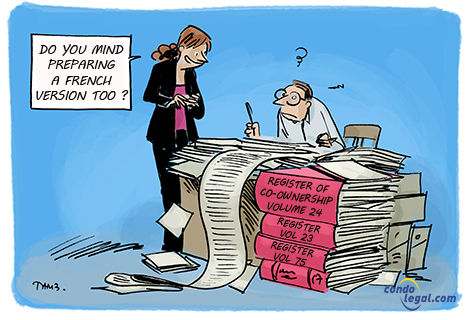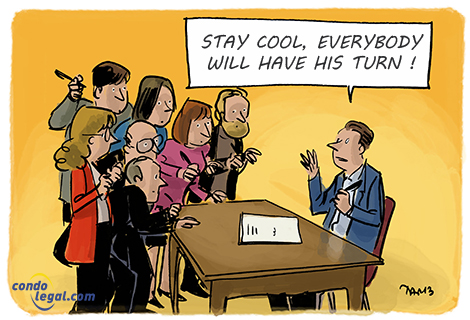Meeting officers

The declaration of co-ownership generally contains the terms and conditions concerning the conduct of the meeting of co-owners by defining rules of procedure and the role of the meeting officers. Key figures of the assembly of co-owners, they ensure the smooth running of it. Their appointment is therefore necessary for the holding of any meeting of co-owners. These are generally elected at the start of the meeting, in a separate vote taken by an absolute majority of the votes of the co-owners present or represented (50% of the votes plus one). This is an obligation that cannot be waived, because any decisions taken before their election has no legal value.
Function
Each officer holds office until the meeting appoints a successor, or until he resigns. The range of titles and duties allocated to the meeting officers is diverse: president, vice-president, secretary of the meeting and scrutineer. It is the declaration of co-ownership that provides the rules to be followed.
The president of the meeting
At the head of the meeting is its President, who declares the meeting open, leads the discussions, and enforces the procedure and the agenda, in addition to ensuring the smooth and efficient progress of the meeting. The President shall also verify whether the notice calling the meeting was validly given, within the period specified in the declaration of co-ownership, and if all the necessary documents were joined.
A true leader of the debates, his role is to ensure compliance with the agenda. The president of the general meeting must remain unbiased and impartial. He shall not give his opinion nor participates in the discussion. The latter does not hold any discretionary powers and certainly not the right to add items to the agenda that have not been included within the period specified in the Civil Code of Quebec. However, the Law provides that if all the convened co-owners are present and they all consent to an item being placed on the agenda, it may be added and a vote is then possible.
The enforcement of the rules of procedures is also one of his duties for which he must make rulings. He grants and withdraws the right to speak at will. Eventhough he must allow the co-owners to discuss each draft resolution on the agenda of the meeting, he can limit the speaking time of the participants. And in the event a co-owner gets out of hand, insults, or fails to act respectfully towards any person attending a meeting, the president may order that he be expelled.
Its powers and prerogatives are extended: he shall rule on the conformity of documents, such as proxies (power of attorney) and resolutions to be voted on, and ensure that be prepared an attendance sheet and minutes that he will sign.
Moreover, his responsibilities are crucial in the decision-making process of the meeting, because he must ensure that the questions in the agenda are voted on. We remind you that all the items on the agenda are not necessarily questions (for example the budget). In addition, the chairman must decide if each resolution was adopted (or not) under the applicable majority rules, at the latest before the end of the session. After the meeting, he oversees that the Secretary drafts an accurate account of the content of the debates, namely of what took place during the meeting, since he shall approve and sign the minutes (thus this “approval” does not need to be carried out at the next meeting).
The vice-president of the meeting
The vice-president of the meeting acts in lieu of the president, in the event the latter is not able to assume his duties either temporarily or permanently.
The secretary of the meeting
The appointment of a secretary by the meeting of the co-owners is a compulsory prelude to the deliberations because his duty is to draft the minutes. He takes notes of the proposals, summarizes the deliberations, records the votes and reports the interventions of the president of the meeting. Eventough he does not have an active role in the general meeting , he may sometimes ask questions to insure the exactness of the minutes. The minutes shall in no way constitute a transcript, which is why the secretary takes notes only of the essential points of the discussions. Filling an attendance sheet of the co-owners indicating their fraction and number of votes, and also taking note of the name of the person who represents them at the meeting (if any), also falls under his duties .
The scrutineers
In accordance with the declaration of co-ownership, the meeting elects one or more scrutineers of the meeting. Meeting scrutineers ensure a more efficient conduct of votes, counting and totaling them while the meeting resumes.
 WHAT YOU SHOULD KNOW ! Some declarations of co-ownership provide that the meeting officers cannot be members of the Board of Directors of the syndicate. It is your duty to abide to this rule to avoid a contestation of the legality of the meeting and of the decisions taken.
WHAT YOU SHOULD KNOW ! Some declarations of co-ownership provide that the meeting officers cannot be members of the Board of Directors of the syndicate. It is your duty to abide to this rule to avoid a contestation of the legality of the meeting and of the decisions taken.
 WHAT TO KEEP IN MIND : The president, vice-president, secretary and scrutineers (if required) are generally elected at the annual general meeting of the co- owners. They remain in office until the next annual meeting.
WHAT TO KEEP IN MIND : The president, vice-president, secretary and scrutineers (if required) are generally elected at the annual general meeting of the co- owners. They remain in office until the next annual meeting.
 WARNING ! The personal liability of the president of the meeting can be invoked. He may-whether paid or not - therefore be sued in the event of a serious breach of his duties. Prior to assuming this charge, it is advisable to verify if the insurance policy taken out by the syndicate covers the liability of the officers of the meeting.
WARNING ! The personal liability of the president of the meeting can be invoked. He may-whether paid or not - therefore be sued in the event of a serious breach of his duties. Prior to assuming this charge, it is advisable to verify if the insurance policy taken out by the syndicate covers the liability of the officers of the meeting.
Back to the factsheets





